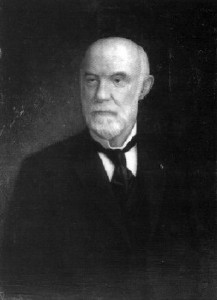American judge
Walter Evans |
|---|
![]() |
|
|
In office
July 1, 1901 – December 30, 1923 |
| Appointed by | operation of law |
|---|
| Preceded by | Seat established by 31 Stat. 781 |
|---|
| Succeeded by | Charles Harwood Moorman |
|---|
|
In office
March 3, 1899 – July 1, 1901 |
| Appointed by | William McKinley |
|---|
| Preceded by | John W. Barr |
|---|
| Succeeded by | Seat abolished |
|---|
|
In office
March 4, 1895 – March 3, 1899 |
| Preceded by | Asher G. Caruth |
|---|
| Succeeded by | Oscar Turner |
|---|
|
In office
May 21, 1883 – March 19, 1885 |
| President | Chester A. Arthur |
|---|
| Preceded by | John Jay Knox Jr. (acting) |
|---|
| Succeeded by | Joseph S. Miller |
|---|
|
In office
1873-1875 |
|
In office
1871-1873 |
|
|
|
| Born | Walter Evans
(1842-09-18)September 18, 1842
Glasgow, Kentucky, U.S. |
|---|
| Died | December 30, 1923(1923-12-30) (aged 81)
Louisville, Kentucky, U.S. |
|---|
| Resting place | Cave Hill Cemetery
Louisville, Kentucky, U.S. |
|---|
| Political party | Republican |
|---|
| Relatives | Burwell C. Ritter (uncle) |
|---|
| Education | read law |
|---|
| Signature |  |
|---|
|
Walter Evans (September 18, 1842 – December 30, 1923) was a United States representative from Kentucky and a United States district judge of the United States District Court for the District of Kentucky and of the United States District Court for the Western District of Kentucky.
Education and career
Born on September 18, 1842, in Glasgow, Barren County, Kentucky,[1] Evans attended the public schools near Harrodsburg, Kentucky.[2] He moved to Hopkinsville, Christian County, Kentucky and served as deputy county clerk in 1859.[2] He served in the Union Army from 1861 to 1863.[1] He served as deputy and later chief clerk of the circuit court.[2] He read law and was admitted to the bar in 1864.[1] He entered private practice in Hopkinsville from 1864 to 1871.[1] He was a delegate to the Republican National Conventions in 1868, 1872, 1880 and 1884.[2] He was a member of the Kentucky House of Representatives from 1871 to 1873.[1] He was a member of the Kentucky Senate from 1873 to 1875.[1] He resumed private practice in Louisville, Kentucky from 1875 to 1883.[1] He was an unsuccessful candidate for election to the 45th United States Congress in 1876.[2] He was the Republican nominee for Governor of Kentucky in 1879.[2] He was appointed Commissioner of the Bureau of Internal Revenue (now the Internal Revenue Service) of the United States Department of the Treasury by President Chester Arthur, serving from May 21, 1883, to April 20, 1885.[1] He returned to private practice in Louisville from 1885 to 1895.[1]
Congressional service
Evans was elected as a Republican from Kentucky's 5th congressional district to the United States House of Representatives of the 54th and 55th United States Congresses, serving from March 4, 1895, to March 3, 1899.[2] He was an unsuccessful candidate for reelection in 1898 to the 56th United States Congress.[2]
Federal judicial service
 Judicial portrait of Evans, 1906.
Judicial portrait of Evans, 1906.
Evans was nominated by President William McKinley on March 3, 1899, to a seat on the United States District Court for the District of Kentucky vacated by Judge John W. Barr.[1] He was confirmed by the United States Senate on March 3, 1899, and received his commission the same day.[1] Evans was reassigned by operation of law to the United States District Court for the Western District of Kentucky on July 1, 1901, to a new seat authorized by 31 Stat. 781.[1] His service terminated on December 30, 1923, due to his death in Louisville, Jefferson County, Kentucky.[1] He was interred in Cave Hill Cemetery in Louisville.[2]
Family
Evans was the nephew of United States Representative Burwell C. Ritter.[2]
References
Sources
 This article incorporates public domain material from the Biographical Directory of the United States Congress
This article incorporates public domain material from the Biographical Directory of the United States Congress
External links
|
|---|
| International | |
|---|
| National | |
|---|
| People | |
|---|
| Other | |
|---|